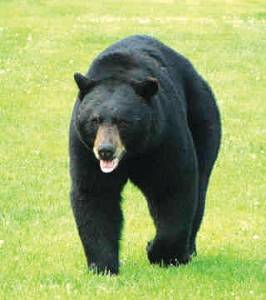Honor the bears
By Joyce White
 The impetus for this focus on bears is a story that originated with the Bangor Daily News and was reprinted in the Sept. 30 edition of the Sun Journal. Nine hunters from North Carolina with several hunting hounds had encircled a bear in the Machias woods. The story focused on one hunter, with a photo of him smiling from a hospital bed. He had shot the cornered bear three times, wounding but not killing him. The bear had then attacked the man, giving two good bites on the leg before the hunter got off the shot that killed the bear.
The impetus for this focus on bears is a story that originated with the Bangor Daily News and was reprinted in the Sept. 30 edition of the Sun Journal. Nine hunters from North Carolina with several hunting hounds had encircled a bear in the Machias woods. The story focused on one hunter, with a photo of him smiling from a hospital bed. He had shot the cornered bear three times, wounding but not killing him. The bear had then attacked the man, giving two good bites on the leg before the hunter got off the shot that killed the bear.
The story mentioned the hunter’s concern that the dogs might be injured and there was sympathy for the wounded hunter. But nowhere in the story was there any mention of concern for the bear. So I sent off a one-line letter to the editor at the Sun Journal stating, “My sympathies are with the bear.†But they refused to print it with the explanation that “it is too mean,†and “hunting is legal.â€
“This we know: the earth does not belong to man, man belongs to the earth. All things are connected like the blood that unites us all. Man did not weave the web of life, he is merely a strand in it. Whatever he does to the web, he does to himself.†— A quote from Chief Seattle’s response to the U.S. government’s request to buy tribal land around 1852.
So, yes, hunting bear is legal, even with dogs, even with bait. Trapping them is legal, too. But is it sporting? Is it the way we should be treating our valued wildlife? We don’t allow hunting deer with dogs or driving deer with groups of men, we don’t allow baiting or trapping deer. Why is it still legal in the State to hunt bear this way?
It certainly is unnecessarily cruel for the bears, not just for the dead or injured bear but for the bear family group. Young cubs seldom survive infancy without their mother but older cubs also are dependent on the mother, not just for the food, warmth and protection she provides but also for her teaching. In the book Among the Bears, Benjamin Kilham relates his observations gleaned from thousands of hours of work with orphaned cubs found in New Hampshire dens, that would not have survived if he hadn’t adopted and raised them.
Kilham, a naturalist researcher, learned firsthand from the several cubs he fostered of the ways they grow from dependence on him — the substitute mother — for food and shelter to learning what to eat in the wild, how to create a winter den, how to exist peaceably with other bears, how to find a mate. These highly-intelligent animals can live 20 or more years.
Our Native ancestors honored the game they killed for meat and skins and hunting deer was a part of the heritage of the Maine community I grew up in. In my opinion, there is a big difference between killing a deer that has been hunted fairly for meat and killing bear simply for sport after having terrorized them with dogs and/or having attracted them with bait.
In the process of treating the black bear as a thing to be shot for pleasure rather than valued as an intelligent, feeling being that shares our world, hunters dehumanize themselves as well as the larger culture which permits it. I see it as a desecration of the bond between humans and the world of Nature we share.
I acknowledge that bear hunting is one of the money-making enterprises in the State and that the powerful hunting lobby will continue to do whatever they can to prevent any changes that would favor the bear. Still, it appears that a lot more people are interested in tracking and observing bears in the wild than are interested in killing them. Let’s honor the bears and their place in the natural world.
Joyce White is a resident of Stoneham.


